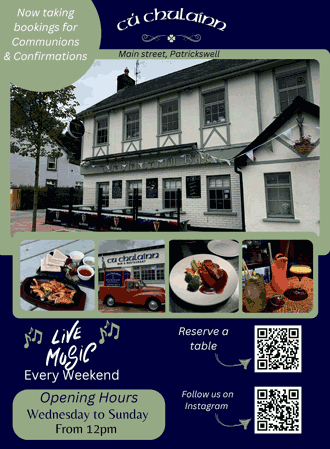
For generations, the historic Quin Abbey in County Clare has drawn visitors from Limerick City. Among its more peculiar pilgrims were two brothers, Joseph Fisher Bennis (1839-1928) and Edward Bennis (1838-1918), writes Limerick historian Sharon Slater.
In the 1860s, the Bennis brothers were swept up in the popular craze of phrenology — the now discredited study of skull shapes as a means of determining personality traits.
Their enthusiasm for phrenology led them to extraordinary lengths. According to a 1936 pamphlet by Joseph’s son, Ernest Henry Bennis, the governor of the Limerick City gaol granted the brothers permission to examine prisoners’ skulls. However, even this did not satisfy their appetite for study.
The Bennis brothers were sons of earthenware dealer William Bennis and his wife Anne, who lived on William Street. The pair continued to work together into their early adulthood. Then, one evening in 1860, after closing their shop, the brothers made the journey to Quin Abbey, where they filled sacks with skulls to bring back to Limerick.
For over 50 years, these skulls were exhibited at lectures delivered by Joseph, who delighted audiences by reading the “bumps” of willing participants.
His position on phrenology did not go unchallenged though, as during an 1876 lecture in the Protestant Young Men’s Society, he was questioned on many of his statements. Joseph did not confine himself to the city, lecturing also in the Rathkeale Young Men’s Association in 1880 and Cork the following year.
The brothers dissolved their partnership in 1866 and went their separate ways professionally.
A life of invention
Edward soon left Limerick to settle in England, where he ventured into industry, establishing a factory in Bolton. In 1872, he developed an automatic self-cleaning furnace, which improved efficiency and reduced smoke emissions.
This was not his only invention. He went on to produce several other furnaces and stokers which gave a significant contribution to industrial production in the UK.
Edward continued his studies throughout his life and was said to be an authority on astronomical matters, frequently lecturing on the subject. At the time of his death in 1918, his factory in Bolton employed over a thousand people, who all turned out to his funeral at the Quaker Burial Ground in Bolton.
Meanwhile, Joseph stayed in the city, moving to 30 George’s Street (now O’Connell Street) and continuing his merchant business with his sons. He continued to give lectures not only in phrenology but in astronomy and debating subjects like temperance over the following decades.
He lived through a transformative era in Limerick’s history, witnessing the decline of the Protestant merchant class, the rise of the Fenians, and the turbulence of Ireland’s struggle for independence. As a Quaker, he remained a pacifist through these upheavals. In 1892, he was involved in a fundraising endeavour to send relief for those suffering from the famine in Russia.
Joseph married Emilie Frances Carroll in 1868, and, of their five children, only two outlived them. Their son, Ernest Henry Bennis, carried on the family’s legacy, maintaining their business until his retirement in 1953. Joseph Fisher Bennis was buried in the Quaker burial ground in Ballinacurra.
Literary legacy
The Bennis brothers were not the only members of their family to leave a mark on Limerick. Their uncle, George Geary Bennis (1793-1866), had an illustrious career in France where he edited the Galiguani newspaper and published several books. His heroic intervention during an assassination attempt on King Louis Philippe in 1848 earned him the title of Chevalier.
Despite leaving Limerick as a young man, George kept abreast of activities in his native city. In 1842, he gave one guinea for the support of the Limerick Philosophical and Literary Society.
Upon his death, George bequeathed his vast collection of books to the citizens of Limerick. His last will stating “my interesting private library of reference… I leave in trust to the Mayor and Corporation of the City of Limerick for the time being, that the same may be formed into a City Library, for the use of the said city for ever, for all classes, male and female.”
However, the donation was mishandled by the Corporation, Mayor Peter Tait complained that the French books would be of no use to the citizens of Limerick and it would be better if they were sold.
Edward Bennis, as the executor of the will was tasked with retrieving the books from France. Two years after the death of his uncle, he expressed his frustration in a letter to Town Clerk John Ellard about the delays in forming a library. This did not resolve the issue and the books were left languishing in storage for nearly four decades before the collection was finally integrated into the Limerick City Library at Pery Square.
Limerick’s own Bard of Thomond, Michael Hogan, captured the scandal in verse, condemning the Corporation for their neglect:
One small transaction here I name.
Be it recorded to their shame.
From France to Limerick Harbour straight
A library was sent of late
Bequeathed by dying man
To the erudite Corporate clan
Poor man he really did resign
His literary pearls to swine
For when the books arrived in dock
Or Neros wanted no such stock
The freightage they refused to pay
The library was cast away
Into a limber-store to rot
And ‘Bogstick’ rose to ‘second thot’.






